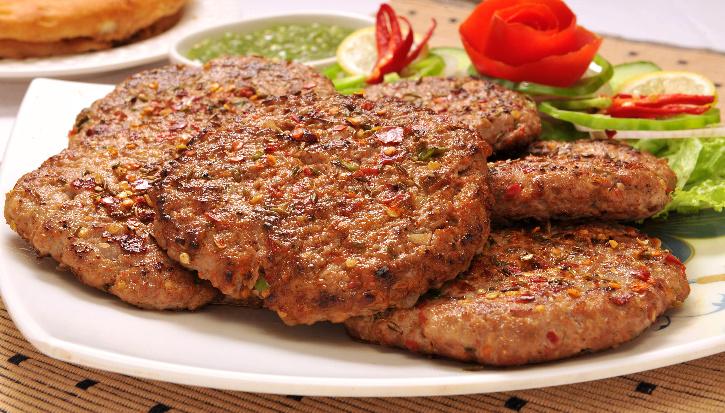HIGHLIGHTS
-
Agricultural and Processed Food Products Export Development Authority (APEDA) under the commerce ministry updated the manual to remove halal from the description.

-
It had earlier said that Halal Certification agencies are accredited directly by respective importing countries. No government agency has any role in this.
-
The move however is likely to make it difficult for meat exporters in India, as some of their biggest markets are in Islamic countries.
KEY STORY
-
The halal tag on food products has been a divisive topic in India and every so often has run into controversies.
-
In the wake of a barrage of complaints from several Hindu right-wing outfits and Sikh bodies, the Agricultural and Processed Food Products Export Development Authority (APEDA) has removed the word ‘halal’ from its ‘Red Meat Manual.’
-
As the debate continues, red meat exported from India will no longer be specified as ‘halal’, instead, it will be mentioned as “The animals are slaughtered to the requirement of importing country/importer.”
-
It was previously described as “The animals are slaughtered strictly according to ‘Halal’ method to meet the requirement of Islamic countries”.
-
But on Monday, the Agricultural and Processed Food Products Export Development Authority (APEDA) under the commerce ministry updated the manual to remove halal from the description.
-
It had earlier said that Halal Certification agencies are accredited directly by respective importing countries. No government agency has any role in this.
-
Halal – an Arabic word indicating what is allowed – refers to a practice of animal slaughter mandated by the Islamic tradition whereby the animal must be killed while it is conscious via a deep incision made to its neck to sever structures like the trachea, oesophagus, carotid artery and jugular vein.
-
Animals must also only be killed by a Muslim. The Islamic faith argues that the method is the most humane way of dispensing of an animal noting that it not only renders the animal immobile but reduces its pain sensitivity as well.
-
However, under the traditions of specific Hindu faiths, consumption of meat from animals that have been killed in this manner is forbidden.
-
Some high-profile companies such as McDonald’s and food-delivery service Licious, in declaring that all their meat must be halal-certified, have drawn the ire of Hindu groups who have argued that it places Hindu producers at a severe economic disadvantage.
-
Many have also stated that, in doing so, such companies are, in effect, restricting the exercise of religious freedom in a pluralistic society. There have even been calls for airline companies to stop providing halal-certified meat on their flights.
There is no condition by Govt. of India that only Halal Meat to be exported. It is requirement of majority of importing countries/Importers.
Halal Certification agencies are accredited directly by respective importing countries. No Govt agency has any role in this.
— APEDA (@APEDADOC) December 27, 2020
-
Various groups, including the right-wing Vishwa Hindu Parishad, had contended that the earlier wording in the manual suggested that halal certification was mandatory for all meat exports. Islamic nations form a large chunk of India’s buffalo meat exports
-
According to some reports, India, in 2019-20, exported Rs 22,668.48 crore worth of buffalo meat with Malaysia, Vietnam, Egypt, Indonesia, Saudi Arabia, Hong Kong, the UAE, Myanmar and the UAE figuring among its main partners.
-
This however doesn’t mean that the meat is not halal certified. The move however is likely to make it difficult for meat exporters in India, as some of their biggest markets are in Islamic countries, where a halal certificate is mandatory.
-
A halal certificate implies that the meat was slaughtered as per Islamic laws and Muslims are allowed to consume it.
Controversies Abounding
-
However, it has been attacked by other religious groups including Hindus, Sikhs and Muslims who allege that halal meat is being forced up on them.
-
Recently, the South Delhi Municipal Corporation (SDMC) had cleared a proposal that asks restaurants or shops to “mandatorily” display whether the meat being sold or served is cut using the ”halal” or ”jhatka” method, officials said on Friday.
-
The order will also be applicable to shops selling raw chicken or meat also.
-
The resolution, tabled by Chattarpur councillor Anita Tanwar last month, a copy of which states that consuming halal meat is “forbidden and against religion in Hinduism and Sikhism”.
-
Recently, a Christian group in Kerala had launched a campaign ahead of Christmas to boycott Halal meat and products saying they cannot consume food items which is against their religious ethos.
-
Last week, a bakery in Kerala’s Ernakulam was forced to remove ‘halal’ sticker by Hindu Aikya Vedi activists.
-
They had alleged that the ‘halal sign’ was discriminatory in nature and amounted to segregation of food in the name of religion which is “criminal”.














